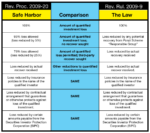Tax Planning for the Foreign Real Estate Investor
By Richard S. Lehman & Associates, Attorneys at Law
The general principles discussed herein are not intended to be legal or tax advice and taxpayers should consult with their individual legal, accounting and tax advisors.
I. TAXPAYER STATUS FOR U.S. INCOME TAX PURPOSES
* The Foreign Investor
* Nonresident Alien Individuals
* Foreign Corporations
II. TAXATION PATTERN
* U.S. Taxpayers
* Foreign Taxpayers
III. OWNERSHIP OF REAL PROPERTY
* Individual Ownership and Conduit Entities
* Corporate Ownership Both Foreign and U.S.
IV. TAX PLANNING BENEFITS AND TRAPS UNIQUE TO THE FOREIGN INVESTOR IN REAL ESTATE
* Tax Treaties
* A Single U.S. Tax
* Portfolio Interest
* Sale of Stock/Foreign Corporation
V. THE TAX PLANNING STRUCTURES
* Individual Ownership/Pass Through Entity
* Foreign Corporate Ownership
* Real Estate Holding Company
Very often Foreign Investors are unfamiliar with the federal and state tax laws that they will face when investing in U.S. real estate. Often this lack of knowledge can be costly with Foreign Investors paying unnecessary taxes.
The following is a checklist of issues that may be helpful to investors in the United States to avoid tax problems.
I. TAXPAYER STATUS FOR U.S. INCOME TAX PURPOSES
* The Foreign Investor – A Nonresident Alien Individual or a Foreign Corporation
* Nonresident Alien Individual
- No Green Card – No Permanent Residency
- No Substantial Presence in the U.S.
- No Tax Treaty Benefit as to Residency
* The Foreign Corporation
The Foreign Investor in the United States
A Foreign Investor generally is defined as either an individual person who is a nonresident alien or a foreign corporation (or a foreign entity treated as a corporation under United States tax law).
Who is a Nonresident Alien Individual in the United States?
A nonresident alien individual will be any citizen of a country other than the United States who is not a “U.S. resident” for U.S. income tax purposes. An alien is not considered to be a U.S. resident for tax purposes if the alien does not have (1) a green card representing permanent residency or (2) a “substantial presence” in the U.S. as described below.
An alien individual has a “substantial presence” in the United States for the calendar year in which the alien is both physically present in the U.S. for at least 31 days and; in that same calendar year is considered to have been in the U.S. for a total of 183 days or more during the past three years.
For purposes of this 183-day requirement, each day present in the United States during the current “combined” calendar year counts as a full day, each day in the preceding year as one-third of a day and each day in the second preceding year as one-sixth of a day.
The United States has tax treaties with many countries. These treaties generally provide that the residents and corporations of each country to the treaty are entitled to a more liberal tax treatment than residents and corporations of non-treaty countries. The concept of residency under the treaties is different then the general definition and may permit a nonresident alien to spend more time in the U.S. each year without being a U.S. tax resident.
What is classified as a Foreign Corporation in the United States?
A foreign corporation is a corporation that is not organized under the laws of the United States or any one of the states of the United States. A foreign corporation’s articles of incorporation will reflect whether it is a foreign corporation or a domestic corporation.
II. TAXATION PATTERN
United States Taxpayers
* U.S. Citizens, Resident Aliens and Domestic Corporations – Real Estate Income Subject to Taxation
- Income Taxation – Worldwide Income
- Estate and Gift Taxation (Individuals only) – Worldwide Assets
U.S. citizens, resident aliens and domestic corporations are subject to taxation on their worldwide income, including real estate income. United States citizens and resident aliens are also subject to a U.S. estate tax and gift tax on transfers of their worldwide assets, including real estate.
Foreign Taxpayers
* Nonresident Aliens and Foreign Corporations -Real Estate Income Subject to Taxation
- Income Taxation – United States Real Estate Income
- Generally taxed on net income similar to US Taxpayers
- Several Important Exceptions
* Capital Gains Taxation
- Alien Individual – Individual Tax Rates
- Foreign Corporation – Corporate Tax Rates
* Estate Taxation
- Alien Individual Residency for Estate Tax Purposes
- U.S. Real Property, U.S companies holding U.S. Real Property and the U.S. estate and gift taxes
* The Branch Tax (Foreign Corporation Only)
Income Tax
Nonresident aliens and foreign corporations may also be subject to United States income tax laws; but only under limited circumstances. Income derived by a Foreign Investor from United States real estate has its own unique taxation pattern that is different in many instances from other types of income earned by the Foreign Investor. A Foreign Investor will generally pay income tax like a United States investor on its real estate income (a special one-time election may be required in certain circumstances) and the Foreign Investor will pay tax on capital gains derived from a sale of United States real property like the U.S. taxpayer.
Capital Gains
Like the U.S. taxpayer, in the capital gains situation, there is a distinct benefit between capital gains earned by a nonresident alien individual for U.S. real estate investments who will be taxed at the lower long-term capital gains rate of 15% and the foreign corporation that might carry a Florida state and Federal income tax approaching 40%.
Estate/Gift Taxes
A nonresident alien individual can be subject to the United States estate and gift taxes. However, non- resident aliens are subject to U.S. estate and gift taxes only on assets situated in the U.S. U.S. real estate is one of the items that is subject to U.S. estate and gift taxes.
Residency
The definition of non-residency for estate and gift tax purposes is completely different than the definition of residency for income tax purposes. A nonresident alien for estate and gift tax purposes is an individual whose “domicile” is in a country other than the U.S. Domicile is a subjective test based on one’s intent of permanency in a country.
The Branch Tax
There is an additional tax that foreign corporations must be aware of. This is a major trap for the unwary. Subject to the provision of a potentially applicable United States tax treaty; a foreign corporation may be subject to not only the combined Florida and Federal income tax approaching 40%; but depending upon the facts and circumstances, foreign corporations with earnings from United States real property investments could be subject to an additional United States tax known as the Branch Tax.
The Branch Tax is a 30% tax applied to foreign companies that is the equivalent of the tax imposed on dividends paid by domestic corporations to foreign shareholders in the absence of an applicable United States tax treaty.
III. OWNERSHIP OF REAL PROPERTY
* How Should the Foreign Investor Hold U.S. Property – Alien Individual Ownership, Partnerships, Limited Liability Companies and Foreign and Domestic Corporations
- Capital Gains Benefits
- Ordinary Income Taxes
- Estate Tax Burdens
An alien individual may conduct his or her real estate business in the United States as an individual owner of real property, as a partner in a partnership, as a member of a limited liability company or as a shareholder of a corporation either foreign or domestic.
Individual Ownership and Conduit Entities
Individual ownership or the use of a limited partnership or limited liability company does generally provide the best income tax results. This is because both partnerships and most (but not all) limited liability companies (“Pass Through Entities”) pass all of their U.S. tax attributes to their individual owners directly. The long-term capital gains rate for a nonresident alien individual will be at a maximum of 15%.
Individual or pass through entity ownership has its income tax benefits but has several drawbacks. The conduct of the real estate business through anything other than the typical corporation will not accomplish the goal of Foreign Investor anonymity.
Ownership individually or through Pass Through Entities require the Foreign Investor Owner to file a U.S. tax return. Furthermore, a nonresident alien’s individual ownership or pass through ownership of U.S. real property will also most likely subject the nonresident alien to a U.S. estate tax on the equity value of the real property. The Foreign Investor may at times be forced to trade off the income tax benefit versus these other exposures.
Corporate Ownership
The ordinary income rates and capital gain rates of a corporation are the same. Therefore, both ordinary income and capital gain earned by a corporation can be subject to a rate approaching 40%; as compared to the 15% capital gain rate paid by a nonresident individual owner.
Furthermore, the payment of dividends by the corporation to the nonresident shareholder of a corporation might be subject to an additional U.S. withholding tax on dividends. However, ownership of U.S. real property through the corporate form will insure that individual tax returns do not need to be filed by the individual Foreign Investor.
Often with proper tax planning, the tax barriers of corporate ownership of real estate can be significantly reduced.
IV. TAX PLANNING BENEFITS AND TRAPS UNIQUE TO THE FOREIGN INVESTOR IN REAL ESTATE
* Tax Treaties
* Liquidation of Corporation
- The Problems of Double Taxation
- Foreign Investors – Payment of a Single U.S. tax
* Portfolio Interest
- Tax Free U.S. Income
- U.S. Interest Deductible
- The Restrictions on Portfolio Interest
- Planning Techniques
* Sale of Foreign Corporate Stock
- Tax Benefits
- Practical Applications
Once the form of ownership is determined there are several additional planning tools that may be specifically helpful to Foreign Investors.
Tax Treaties
As mentioned previously, a primary planning tool available to certain Foreign Investors is their ability to rely on a United States tax treaty that may exist with the Foreign Investor’s host country. This type of tax treaty will assure that there is no double taxation between the two countries.
Income will only be taxed at the maximum highest rate of both countries. Treaties may also provide for the prevention of double taxation under the estate tax laws of the two countries, reduce or eliminate the Branch Tax and generally reduce United States taxes on the Foreign Investor’s interest, dividends and business income that are earned from U.S. sources.
A Single U.S. Tax
Even without treaty benefits, Foreign Investors investing in the United States in corporate form can ensure that there will be no dividend or Branch tax on income earned from United States real property by a corporation so long as the corporate vehicle sells or distributes all of its real estate assets and is timely liquidated. This can avoid a second U.S. tax by the Foreign Investor since the distributions from the Corporation that are liquidation proceeds and not dividends, are excluded from further U.S. taxes.
Portfolio Interest
Another planning tool permits Foreign Investors, both corporate and individual, to benefit from the fact that they are permitted to earn tax-free interest income on certain loans to support U.S. real estate investments. By taking advantage of and meeting the requirements of the “portfolio interest rules”, the Foreign Investor may earn tax-free interest instead of taxable real estate profits or dividends.
Sale of Stock/Foreign Corporation
U.S. taxes on real estate profits can be totally eliminated in rare occasions in which a real estate buyer is willing to acquire a Foreign Investor’s shares in a foreign corporation that owns U.S. real estate. A Foreign Investor may form a foreign corporation to own United States real estate. Gain from the sale of shares of stock in that foreign corporation by the Foreign Investor generally is not subject to tax; even if the foreign corporation owns U.S. real estate. Due to its many complexities this technique is applicable only in very limited situations and is not considered to any degree in this outline.
V. THE TAX PLANNING STRUCTURES
* Specific Tax Planning Entities for Nonresident Aliens and Foreign Corporate Real Estate Investors
* Objective – Minimize U.S. Income Tax, Capital Gains and Estate Tax on Real Estate Profits. It is important to note that income tax planning and estate and gift tax planning are often at cross purposes.
* The Structure – Individual or Partnership or Limited Liability Company Ownership
- Income Tax
- Capital Gains Tax
- Estate Tax
* The Structure – Foreign Corporation Ownership
- Income Tax
- Estate Tax
- Branch Tax
- The Structure – A Foreign Holding Company and a U.S. Subsidiary
- Income Tax
- Estate Tax
- Branch Tax
To take advantage of any of the several unique tax benefits and avoid the traps, the Foreign Investor must find the proper investment vehicle that meets the Foreign Investor’s tax needs and his or her other personal and commercial needs. Each Foreign Investor will find that their tax structure will be unique to them and the various tax planning techniques fit in some situations and not others.
There are three very basic structures that will show the different types of tax considerations depending upon the nature of the real estate. The cost factor of any tax planning structure must be considered in advance. Generally, a transaction should be of a certain significant size to benefit from the more complex structures.
Individual Ownership/Pass Through Entity
Individual ownership of real property by a non- resident alien or ownership through a Pass Through Entity results in the nonresident alien being required to file a U.S. tax return and most likely subjects him or her to estate taxes on the real property. However, it is the best vehicle for income tax purposes.
Foreign Corporate Ownership
A Foreign Investor investing in passive real estate (that is not income producing such as raw land), who wishes to avoid estate taxes and preserve anonymity might use a single foreign corporation to own the real estate. The Foreign Investor should know that the capital gains earned by the foreign corporation from the sale of the real estate could be significantly higher than individual ownership. Since there is no annual income from passive real estate holdings, the Branch Tax can be avoided by the liquidation of the foreign corporation after the sale of the foreign corporation’s real estate.
Real Estate Holding Company
A Foreign Investor involved in the active real estate business, such as ownership of income producing property or development property, may as a general rule invest in the following fashion. The Foreign Investor will form a foreign holding corporation that then is the 100% owner of a domestic corporation such as a Florida corporation. The Florida corporation is the direct real estate owner.
This structure can eliminate at least two of the three taxes that the Foreign Investor might face. Since the direct investor in the real estate is a domestic corporation, it need not pay any Branch tax on its profits. Since the Foreign Investor owns only shares in a foreign corporation, there is no estate tax upon his or her demise. The income tax, however, is generally unfavorable as compared to individual ownership.
# # #
Richard S. Lehman
* Georgetown University J.D.
* New York University L.L.M. Tax
* Law Clerk to the Honorable William M. Fay – U.S. Tax Court
* Senior Attorney, Interpretive Division, Chief Counsel’s office, Internal Revenue Service
* Author: “Federal Estate Taxation of Non-Resident Aliens,” Florida Bar Journal
* Contributing Author and Editor: International Business and Investment Opportunities” Florida Department of Commerce, Division of Economic Development, Bureau of International Development (translated in German, Spanish, and Japanese)






